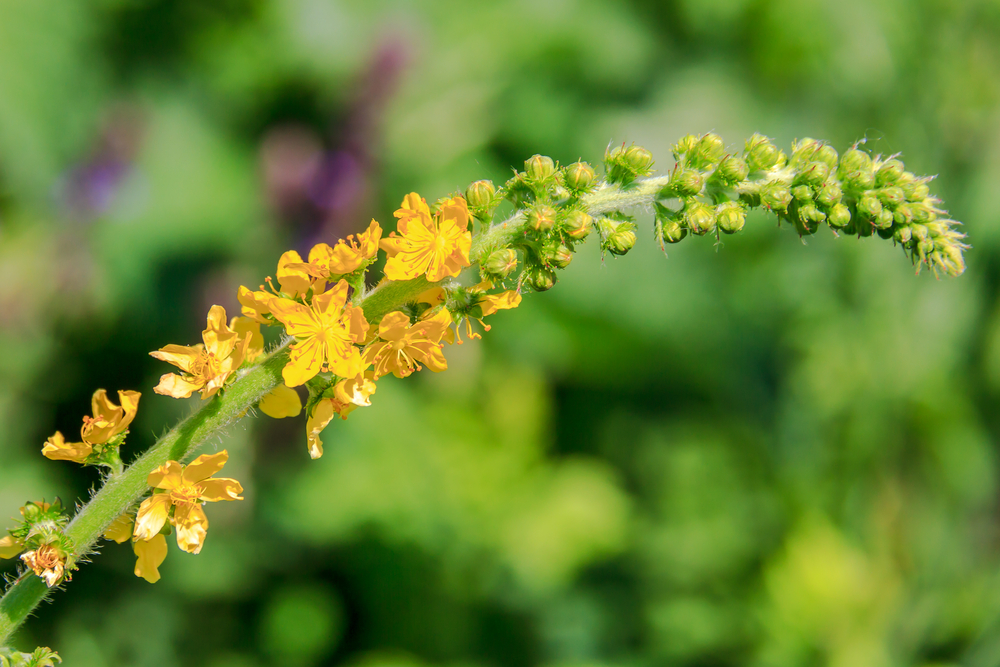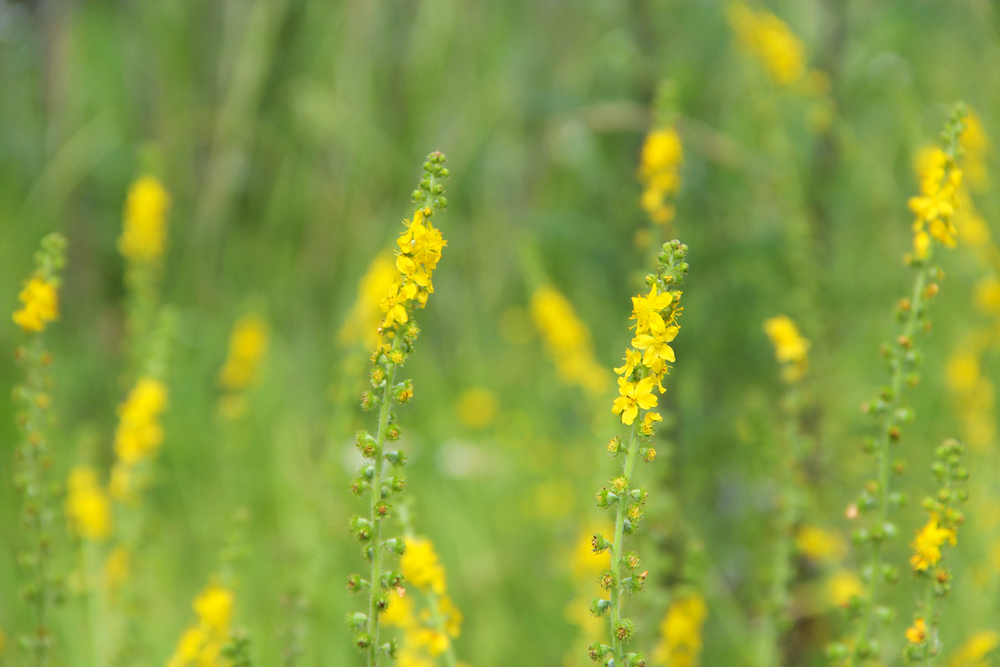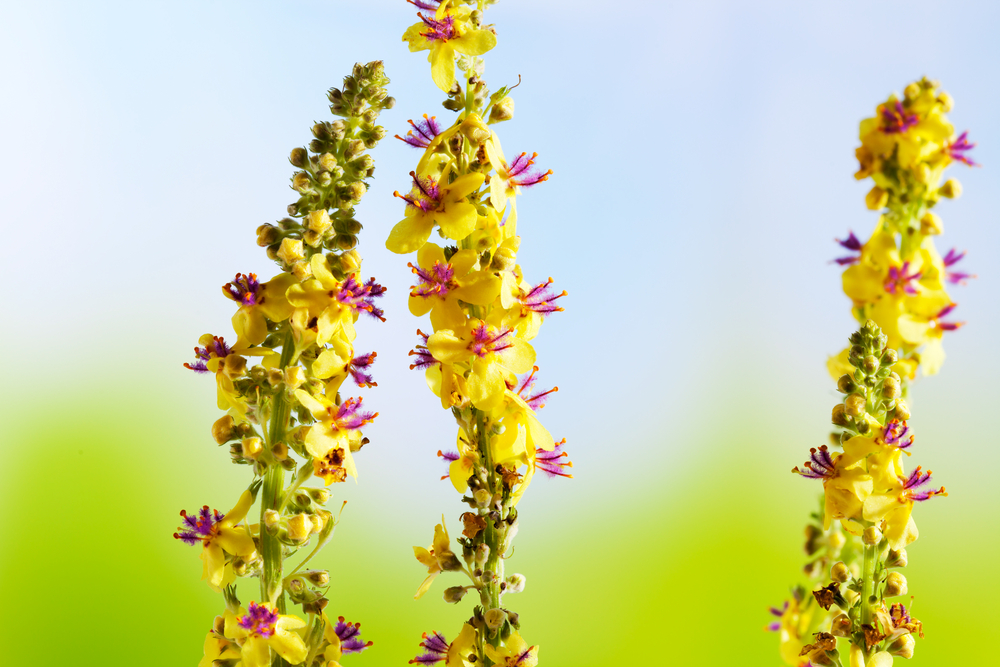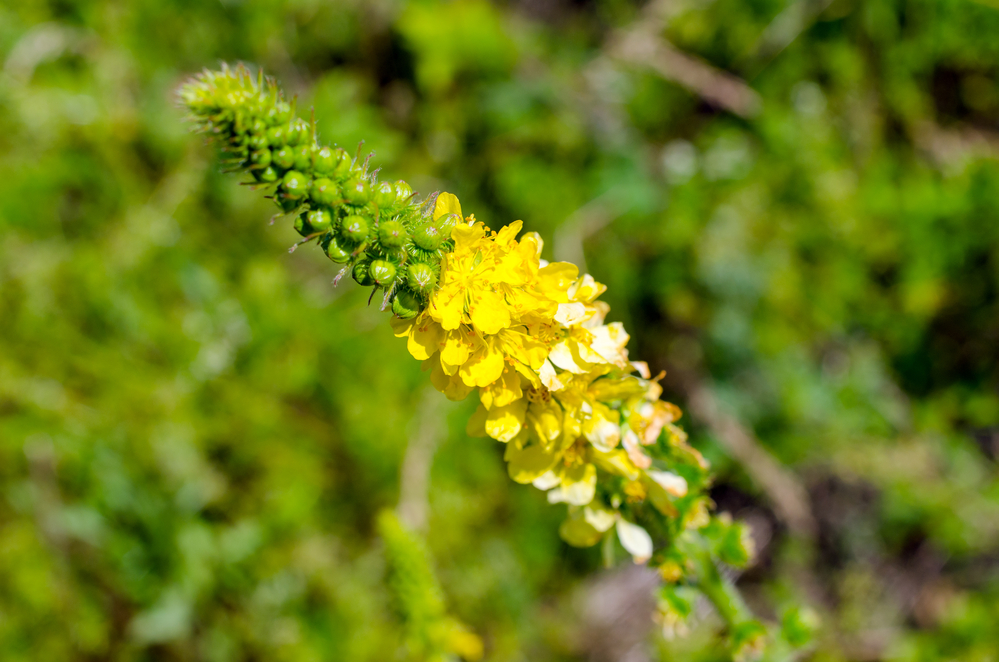So what is Agrimony tea, and why would anyone drink it, let’s dive in!
Agrimony (Agrimonia eupatoria) is a hardy, perennial flowering plant or shrub part of the rose family.
There are over a dozen different species of Agrimony which are found throughout Asia, Europe, the UK, and North America and in parts of Africa.
These plants grow in the wild and are also cultivated in gardens, and the clusters of small yellow flowers bloom from June to September.
Furthermore, aromatic leaves and flowers have been used for centuries to treat or ease several medical conditions.

Traditional and Historic Uses of Agrimonia Eupatoria
There are records of the use of Agrimony by the Chinese, Greeks, Ancient Romans, Native Americans, and Anglo-Saxons.
Various European physicians and healers used the herb, too until the late 19th century when modern medicine became skeptical about its value.
The traditional applications of this plant included treating eye conditions, easing menstrual problems, aiding sleep, treating colic, and soothing coughs and sore throats.
It was also used to stop diarrhea, ease gout, and treat skin conditions, including removing warts.
The Europeans and British, in particular valued Agrimony for its ability to speed up blood clotting, heal wounds (including ones suffered in battle), and treat snake bites.
Benefits of Agrimonia (Agrimony Tea Benefits)
As with many plant-based and natural substances, modern medicine is skeptical of the value of Agrimony without clear, unambiguous scientific and clinical evidence.
While the overwhelming anecdotal evidence entirely convinces many individuals who use herbal remedies, one does need to point out the fact that several sources indicate that there is insufficient evidence to be able to categorically claim clinical benefits.
WebMD, for example, indicates that further clinical evidence is required before the effectiveness of this herb can be established and, if it is effective, to what degree. The specific conditions this site mentions are diarrhea, stomach upsets, irritable bowel syndrome, and sore throats.
However, this source does tentatively concede that early findings indicate that Agrimony may reduce the formation of skin sores in patients suffering from the skin condition Cutaneous Porphyria.
On the other hand, Organicfacts.net and Botanical.com, focus on the health benefits that are derived primarily from historical records and other anecdotal evidence.
These sites claim the diverse health benefits of Agrimony as follows:

Coagulant
This herb’s ability to stop or slow bleeding makes it useful for two medical issues: heavy menstrual bleeding can be reduced, reducing inflammation and pain, and, secondly, a topical application stops or reduces blood flow from wounds.
Blood Purifier
Agrimony can purify the blood, providing several benefits, particularly for the liver and gallbladder.
A healthy liver is far better able to rid the body of toxins
Digestive Aid
Constituents in this herb have anti-inflammatory properties, which help to soothe the lining or membrane of the digestive tract.
This can be particularly helpful for treating mild diarrhea. It may benefit irritable bowel syndrome by easing cramps and regulating mucus production.
Kidney and Bladder Benefits
The astringent properties in Agrimony help with bladder control, and the diuretic qualities help to flush the kidneys and rid the body of excess water and fluid.
Flushing out the kidneys also helps prevent or eliminate kidney stones.
Respiratory Issues
These health problems can also be eased – not cured – by the consumption of this plant as it decreases inflammation which reduces coughing, soothes a sore throat, and reduces sinus congestion.
This makes it a most useful herb for those suffering from various respiratory conditions ranging from colds to bronchitis and asthma.
Moderation of Insulin and Glucose Uptake
While studies still have a lot of ground to cover, there are indications that an element in Agrimonia tea has the potential to aid diabetics with controlling blood sugar levels
Dermatology
Whether ingested or applied topically, the herb reduces common skin complaints such as acne, pimples, certain rashes, and bruising. It can also be used for minor cuts and abrasions.
Hair and Nail Strength
An ingredient in Agrimony improves the health and strength of nails and hair, reducing the risk of breakage and giving hair a shine.
Although there is not as much clinical and scientific evidence supporting the health claims made on behalf of herbal tea as proponents would like, there’s no shortage of anecdotal evidence.
But, as with any other substance – natural or not – one consumes, caution must be used. It is crucial to consult your pharmacist or doctor before taking the Agrimony herb for anything health related. You must ensure that there are no potential risks or contraindications to your health.

Active Ingredients Found in the Agrimony Herb
So, what does Agrimony contain that provides this host of benefits?
The short answer is a large number of valuable compounds!
- Tannin (a complex polyphenol) is what makes the preparation an effective astringent to use on wounds and cuts.
- Palmitic acid, which is a common saturated fat, has benefits for the skin.
- Catechin is a water-soluble polyphenol that acts as an effective antioxidant.
- Thiamine is a water-soluble form of Vitamin B which helps the body to metabolize proteins and fat.
- Quercitrin is believed to be both an anti-inflammatory and an antioxidant.
- Silicic acid is the ingredient that boosts hair and nail health. Finally, Ursolic acid is a diuretic and has anti-inflammatory properties.
How to Make Agrimony Tea
Agrimony Tea is made using leaves, flowers, and thin stems in either fresh or dried form. The strength of the tea will depend on what one wants to drink it for.
A strong tea should be brewed for use as a gargle for a cough or sore throat, whereas a far weaker tea should be made if one is drinking it for other uses.
- Place the dried Agrimony in a pot or container (preferably not a plastic or metal one as they can taint the tea). The ratio is 1 to 2 teaspoons per 1 liter of boiling water
- Pour the boiling water over the Agrimony
- Cover the container
- Leave the tea to steep or draw for 5 to 15 minutes, depending on the desired strength.
- Pour the tea through a strainer to remove any plant matter.
The tea can be drunk hot or cold, or strong tea can be used to soak a compress that will be applied topically for skin conditions.
When used as a gargle, the tea must be allowed to cool completely first to avoid burns or further inflammation of the throat and mouth (There’s at least one person out there who is going to save themselves a burnt throat after reading that last line!)
As with most other teas, it is a case of personal taste as to how strong the tea should be and whether a sweetener such as honey is needed.
Furthermore, milk should not be added to this aromatic, almost spice-like tea.
How much tea one consumes will depend on various factors unique to each individual. It’s therefore very important to be guided by the instructions on the packaging or by your herbalist, pharmacist, or medical practitioner.

Possible Side-Effects, Contraindications & Interactions
Just because Agrimony Tea is natural and plant-based does not mean that it is 100% safe or safe for everyone. Certain individuals should be especially cautious:
- Women who are pregnant or breastfeeding as the effect of the plant on this group is not sufficiently well known
- Women who are trying to conceive should also not use this herb as it can affect the menstrual cycle
- Diabetics who are on medication to lower their blood sugar levels. Given this herb lowers these blood levels, the two in combination could result in blood sugar levels that are too low
- Patients with bleeding disorders or prone to excessive bleeding are also advised to avoid Agrimony
- Individuals with skin that is very sensitive to sunlight may become more prone to sunburn and sun damage as a result of regular consumption of this tea
- Those who are allergic, sensitive to, or intolerant of any active ingredients should avoid this herb.
Consuming too much tea of agrimonia could cause one to develop gastrointestinal problems, including constipation or vomiting.
If you’re drinking it for some alleged health benefits of agrimony tea, just don’t let that replace other ways of treating whatever it is that you’re drinking it to help treat.
If you’re drinking it just as a tea that you enjoy drinking, all the more power to you.
At the end of the day, everyone has their own reasons for enjoying various types of tea, and as long as it’s not hurting you – sip on!
